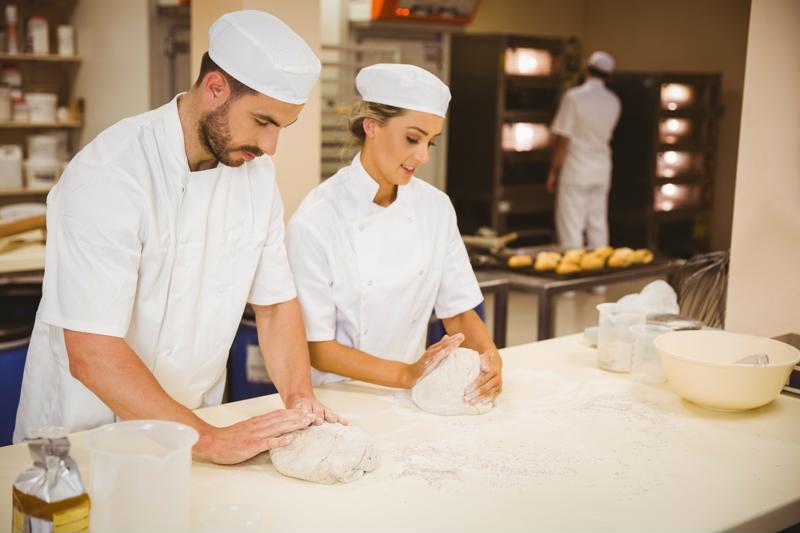Students at culinary schools in Boulder and across the nation share a common goal: To start a career as a chef and build a resume that allows them to compete for higher-level positions in the world of food. Making a good first impression is a critical consideration when it comes to entering the culinary industry on a career path, as is understanding how to build your reputation in such positions and set the stage for professional growth.
Let's look at some practical advice for starting your career on the right foot and standing out as a dependable, trustworthy member of the brigade de cuisine.
 Finding the right time to ask questions or offer suggestions is especially important for new chefs.
Finding the right time to ask questions or offer suggestions is especially important for new chefs.Knowing when to speak up – and when to rely on your own knowledge
The pace in professional kitchens is notoriously fast. Chefs have to be confident in their general abilities and the specifics of preparing the dishes for which they're responsible hundreds of times in every single service. The best answers to questions and commands during these busy times are simple: "Yes, chef!", "No, chef!", "Right away, chef!"
Understanding when to ask questions about new dishes on the menu or for an expert opinion on technique or mise en place can help you appear more thoughtful and reliable to the senior chefs in your kitchen. Gauging the mood in the room and the amount of work in front of everyone is vital.
You should rely on your thorough culinary school education and restaurant-specific training while firing a half-dozen entrees. At the same time, asking a question that you know you can't find the answer to during a slow period – between the lunch and dinner rush or before the restaurant opens – can help you learn more and demonstrate a level of care for your craft. Always consider the circumstances before starting an in-depth dialog.
The same guidance applies to making suggestions – do so when your head chef or station leader has a little time to consider your proposal. And be sure to remember that just because you have a good idea, that doesn't mean it's automatically a good choice for the restaurant's needs or the kitchen's abilities at that specific time. If you stick to thoughtful, carefully considered questions and recommendations, you're more likely to gain the respect and trust of the veterans in the kitchen.
Maintaining your equipment to a high standard
Kitchens take all sorts of approaches to providing uniforms and equipment to staff. While the details can change from one setting to the next, most chefs will have to bring their own knives, thermometers and other tools to the job at many points in their career. They also have to own certain pieces of protective gear, like non-slip shoes.
Maintaining your equipment, both tools and those items designed to keep you safe in a work environment that has many potential hazards, is both a common-sense responsibility and a way to demonstrate your professionalism and commitment. Regularly sharpening and honing knives, testing your thermometers and cleaning and maintaining your kitchen shoes – and getting new ones when necessary – demonstrates a commitment to the career that goes beyond the bare minimum.
Being a positive force in the kitchen
Life in the back of house is hard work that can be very rewarding for culinary professionals who care about their careers. To that end, avoid the temptation to be overly negative or complain on a regular basis. Jokes and conversations at the appropriate times – on breaks, outside of the peak of lunch or dinner service – is often not a big deal, but more biting commentary can reflect negatively on your professional standards.
Colorado culinary school graduates can reflect on this guidance to put their best foot forward while starting their careers. To learn more about building a strong educational foundation in the culinary arts, reach out to us today.

